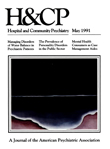A Rational Approach to Disorders of Water Balance in Psychiatric Patients
Abstract
Many mentally ill patients, particularly those with schizophrenia, have idiopathic or medication-induced disorders of water balance, which include excessive water intake, excessive water excretion, and impaired water excretion. Patients with these disorders manifest polydipsia and polyuria with or without symptomatic hyponatremia (low serum sodium concentration). Other serious sequelae include life-threatening water intoxication. The author reviews the physiology of normal water balance and the mechanism, causes, clinical presentation, and diagnosis of disorders of water balance. Interventions must first focus on identifying reversible factors. Medication-induced water imbalance can usually be reversed without compromising treatment of the underlying psychiatric disorder. A fully effective treatment for idiopathic polydipsia has not been found, although providing optimal treatment for the underlying psychiatric disorder often helps. Monitoring changes in body weight, in conjunction with measures of serum sodium, prevents water intoxication.
Access content
To read the fulltext, please use one of the options below to sign in or purchase access.- Personal login
- Institutional Login
- Sign in via OpenAthens
- Register for access
-
Please login/register if you wish to pair your device and check access availability.
Not a subscriber?
PsychiatryOnline subscription options offer access to the DSM-5 library, books, journals, CME, and patient resources. This all-in-one virtual library provides psychiatrists and mental health professionals with key resources for diagnosis, treatment, research, and professional development.
Need more help? PsychiatryOnline Customer Service may be reached by emailing [email protected] or by calling 800-368-5777 (in the U.S.) or 703-907-7322 (outside the U.S.).



